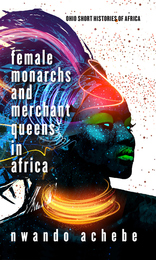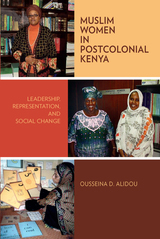3 books about Women civic leaders

Female Monarchs and Merchant Queens in Africa
Nwando Achebe
Ohio University Press, 2020
An unapologetically African-centered monograph that reveals physical and spiritual forms and systems of female power and leadership in African cultures. Nwando Achebe’s unparalleled study documents elite females, female principles, and female spiritual entities across the African continent, from the ancient past to the present. Achebe breaks from Western perspectives, research methods, and their consequently incomplete, skewed accounts, to demonstrate the critical importance of distinctly African source materials and world views to any comprehensible African history. This means accounting for the two realities of African cosmology: the physical world of humans and the invisible realm of spiritual gods and forces. That interconnected universe allows biological men and women to become female-gendered males and male-gendered females. This phenomenon empowers the existence of particular African beings, such as female husbands, male priestesses, female kings, and female pharaohs. Achebe portrays their combined power, influence, and authority in a sweeping, African-centric narrative that leads to an analogous consideration of contemporary African women as heads of state, government officials, religious leaders, and prominent entrepreneurs.
[more]

A Jumble of Needs
Women’s Activism and Neoliberalism in the Colonias of the Southwest
Rebecca Dolhinow
University of Minnesota Press, 2010
Many immigrant communities along the U.S. border with Mexico are colonias, border settlements lacking infrastructure or safe housing. A Jumble of Needs examines the leadership of Mexican women immigrants in three colonias in New Mexico, documenting the role of NGOs in shaping women’s activism in these communities. Ethnographer Rebecca Dolhinow, who worked in the colonias, uncovers why such attempts to exercise political agency are so rarely successful.
Central to the relationship between NGOs and women activists in colonias, Dolhinow argues, is the looming presence of the neoliberal political project. In particular, the discourses of caretaking that NGOs use to recruit women into leadership positions simultaneously naturalize and depoliticize the activist work that these women do in their communities. Dolhinow discovers the connections between colonias as isolated communities and colonia leaders as political subjects who unintentionally reinforce neoliberal policy. In the long run, she finds, any politicization that might take place is limited to the women leaders and seldom involves the community as a whole.
Surprisingly, Dolhinow reveals, many NGOs promote neoliberal ideals, resulting in continued disenfranchisement, despite the women’s activism to better their lives, families, and communities.
[more]

Muslim Women in Postcolonial Kenya
Leadership, Representation, and Social Change
Ousseina D. Alidou
University of Wisconsin Press, 2013
In education, journalism, legislative politics, social justice, health, law, and other arenas, Muslim women across Kenya are emerging as leaders in local, national, and international contexts, advancing reforms through their activism. Muslim Women in Postcolonial Kenya draws on extensive interviews with six such women, revealing how their religious and moral beliefs shape reform movements that bridge ethnic divides and foster alliances in service of creating a just, multicultural, multiethnic, and multireligious democratic citizenship.
Mwalim Azara Mudira opened a school of theology for Muslim women. Nazlin Omar Rajput of The Nur magazine was a pioneer in reporting on HIV/AIDS in the Muslim community. Amina Abubakar, host of a women's radio show, has publicly addressed the sensitive subject of sexual crimes against Muslim women. Two women who are members of parliament are creating new socioeconomic and political opportunities for girls and women, within a framework that still embraces traditional values of marriage and motherhood.
Examining the interplay of gender, agency, and autonomy, Ousseina D. Alidou shows how these Muslim women have effected change in the home, the school, the mosque, the media, and more—and she illuminates their determination as actors to challenge the oppressive influences of male-dominated power structures. In looking at differences as opportunities rather than obstacles, these women reflect a new sensibility among Muslim women and an effort to redefine the meaning of women's citizenship within their own community of faith and within the nation.
[more]
READERS
Browse our collection.
PUBLISHERS
See BiblioVault's publisher services.
STUDENT SERVICES
Files for college accessibility offices.
UChicago Accessibility Resources
home | accessibility | search | about | contact us
BiblioVault ® 2001 - 2024
The University of Chicago Press









